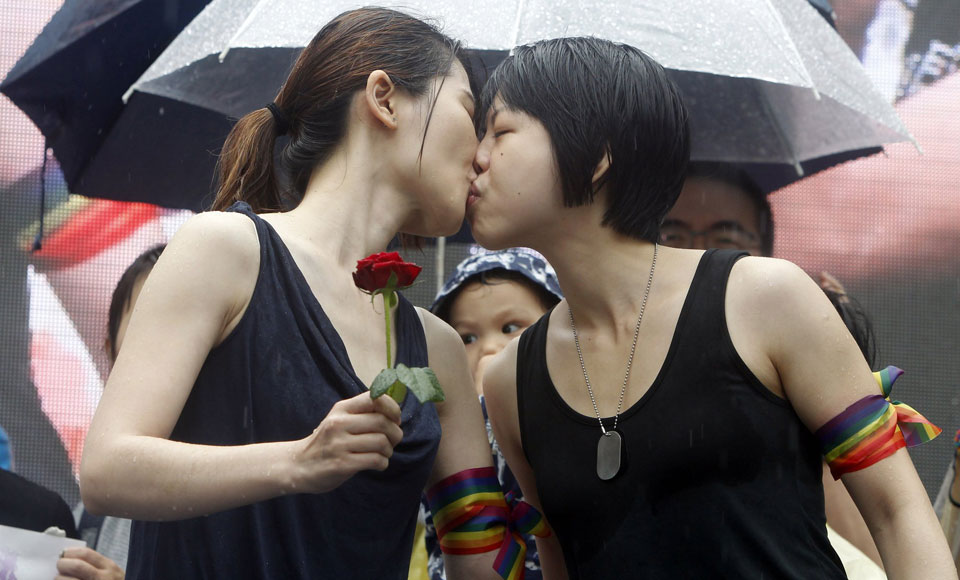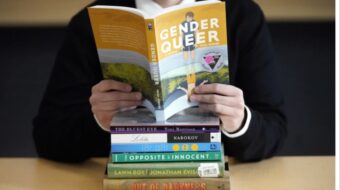
The efforts of tireless activists like Chi Chia-wei, who has been campaigning for gay rights since he first came out in 1975, have paid off in Taiwan. Two years ago, the country’s highest court made history by ruling it was unconstitutional to define marriage as only being possible between one man and one woman. Today, the parliament has finally passed legislation to give the ruling legal force. Taiwan is now the first jurisdiction in Asia to have marriage equality, setting a new bar for other countries in the region.
Ruling on a case brought by Chi, the Constitutional Court declared in May 2017 that the law prohibiting same-sex marriages violated “the people’s freedom of marriage” and “the people’s right to equality.” It ordered the legislature of Taiwan to amend the Family Code within two years to allow two persons of the same gender to register a union. With only days to go before the deadline, parliament approved an article Friday allowing the registration of same-sex marriages.
There were three competing bills which offered varying levels of recognition and rights. The one sponsored by the governing Democratic Progressive Party, regarded as the most progressive, was passed, by a vote of 66-27. It was the only bill seen as acceptable by LGBTQ activists.
Decades of struggle
The landmark court decision of 2017 set a high standard for legislators to meet, as it went further than simply ruling on the procedural right to equal treatment under the law. Justices made a strong statement on the inherent equality of people no matter their sexuality. “Sexual orientation,” the court said, “is an immutable characteristic that is resistant to change.”
The decision also revisited how sexual minorities have been treated in Taiwan in the past. “In our country, homosexuals were once denied by social tradition and custom…. As a result, they have been locked in the closet.”

That kind of exclusion and discrimination is exactly what Chi Chia-wei first started campaigning against when he came out in the mid-1970s as a teenager. During that time, Taiwan was still under martial law and ruled by the military dictatorship of the Nationalist Party (Kuomintang). In 1986, Chi was imprisoned for several months when he submitted his first petition for gay marriage.
It was his 2017 lawsuit seeking legal recognition for his 30-year relationship with his partner that moved the Constitutional Court to declare for marriage equality.
The path leading from the court’s original ruling to today’s legislative victory was not an easy one. Conservative opponents staged referendums in an attempt to reverse the order of the court, while other countries in the region moved in the opposite direction of LGBTQ equality.
Campaigners spent the last two years lobbying parliament to implement nothing less than full equality as it considered legislation to meet the court’s order. There were concerns that one of the watered-down bills granting something less than full, equal marriage would be passed.
The effort garnered the support of not just civil society activist groups but also a number of big-name Taiwanese celebrities. Singer Jolin Tsai, whose songs and music videos frequently featured LGBTQ themes and individuals, has been a vocal backer. Her outspoken support for equality often resulted in censors in other countries, such as Singapore, banning her music from the airwaves. After the bill passed, she congratulated Taiwan’s LGBTQ community, declaring, “Everyone deserves happiness!”
Taiwanese singer Jolin Tsai used her music to support the campaign for equality. This music video for the song “We’re All Different, Yet the Same,” features an older woman who is unable to accompany her partner to the hospital or make medical decisions for her because she was legally not a member of the family. | Jolin Tsai via YouTube
The Taiwan Alliance to Promote Civil Partnership Rights, one of the island’s lead LGBTQ organizations, continuously reminded Taiwanese President Tsai Ing-wen that during her campaign she had expressed support for LGBTQ equality.
In a tweet just ahead of the vote on Friday, Tsai had said, “Today we have a chance to make history and show the world that progressive values can take root in an East Asian society.” It was MPs from her Democratic Progressive Party that supplied the votes pushing the legislation across the finish line.
As soon as the votes were counted, the president declared, “On May 17th, 2019 in Taiwan, Love Won.”
Jennifer Lu, the lead coordinator of Marriage Equality Coalition Taiwan told the press that she was surprised by the outcome today but happy. She said Friday marked an important victory but cautioned, “It’s still not full marriage rights; we still need to fight for co-adoption rights, and we are not sure about foreigner and Taiwanese marriage, and also gender equality education.” Lu said that today was “a very important moment, but we are going to keep fighting.”
Outpost for LGBTQ equality in Asia
Taiwan has for a long time been seen as at the forefront in Asia when it comes to LGBTQ openness and acceptance. At last year’s pride parade in Taipei, an estimated 130,000 people marched in the streets.
The big step forward today sets a new standard in Asia at a time when countries are moving in a variety of directions on LGBTQ issues—some backward, some forward.
In Singapore, for instance, new restrictions have been put in place in recent years to contain the growth of that nation’s annual LGBTQ event, Pink Dot. In the conservative Muslim province of Aceh in Indonesia, two young gay men were recently beaten in public for having sex, while 141 others were arrested in the capital city of Jakarta on trumped-up pornography charges. And the Kingdom of Brunei recently passed a law mandating death by stoning for being gay, though after facing massive international backlash, the government claims it will not enforce the penalty.
In the opposite direction, India’s Supreme Court last year overturned the section of the criminal code that had made gay sex a criminal offense. In 2015, gay weddings were decriminalized in Vietnam, but legislation granting legal recognition for same-sex unions has stalled. A Hong Kong court ruled last year that same-sex couples living in the city can sponsor their foreign spouses for visas like heterosexual couples, but there have been no further moves to recognize unions.
Today’s ruling move by the legislature in Taipei further cements Taiwan’s place as the leader on LGBTQ equality issues in the region and is encouraging activists in other countries.












Comments